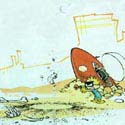|
There is a Broken Token organizer thingy for 7 wonders if you are interested. They are redesigning it for Babel, though. It's fairly fascinating that a game about Robinson Crusoe is ranked 3rd overall on the "Thematic" game rankings on Boardgamegeek (12th overall on uncategorized rankings) 1. War of the Ring 2nd Ed 2. Mage Knight 3. Robinson Crusoe 4. Eldritch Horror 5. Dead of Winter 6. War of the Ring 1st Ed 7. Battlestar Galactica 8. Twilight Imperium 3rd Ed 9. Descent 2nd Ed 10. Blood Bowl 11. Rune Wars 12. Chaos in the Old World 13. Earth Reborn 14. Pathfinder Cardgame 15. Star Wars: Imperial Assault It's neat that there is this game about a classic literature character from a few centuries ago, and I'm glad it exists, but I have to imagine that it would sell a couple orders of magnitude more copies if it were about some genre fiction thing like zombies. I'm assuming it's basically equivalent to burning money but maybe it does better in Europe? Someone should make a thematic game about Cormac McCarthy's The Road or Blood Meridian 
|
|
|
|

|
| # ? May 10, 2024 18:13 |
|
Robinson Crusoe is a pretty flawed game that's ranked so high partly because of the dearth of quality thematic co-ops - that the next two games on the list are Eldritch Horror and Dead of Winter says a lot. I actually think it benefits from an unusual theme in that respect too, helps it stand out as not just another lovely zombie/cthulhu co-op.thespaceinvader posted:I'd suggest Caverna (definitely this over Agricola, it's IME a better game, and the theme is a lot more obvious and fun) I finally played Caverna yesterday and just found it weird. You're avalanched with resources all game from spaces that give you 3 different things at once, you can put them almost anywhere you want, and while adventuring dwarves feels pretty fun it's also basically just shopping for anything you need and can't get with the game's God resource (rubies). Final scores where 79-80-82 which makes me worried that it's too easy to just do whatever the hell you want with every path being balanced to roughly the same numbers. I can understand why people would want a resource game that feels less constricted than Agricola, but Le Havre does that much better IMO. Agricola feels like a knife fight on the edge of starvation and Le Havre a refined fencing match, Caverna was like a hotdog eating contest with the last person to vomit winning. edit: the other thing I disliked about it was that the near-constant harvests almost completely strip away the feeling of pacing and tension Agricola has as the game's stages shorten. Despite having the same number of actual rounds Agricola feels like it accelerates towards the end, whereas Caverna feels like it's dragging longer and longer. Bubble-T fucked around with this message at 01:07 on Jan 5, 2015 |
|
|
|
fozzy fosbourne posted:Someone should make a thematic game about Cormac McCarthy's The Road or Blood Meridian Holy crap. A hundred times this. Roll a d10 to not get eaten by cannibals/not get raped, scalped and murdered by commanche/carry the fire/not get raped and murdered by the judge. In all seriousness though, both of those stories would be cool game fodder. As would No Country for Old Men.
|
|
|
|
Bubble-T posted:Robinson Crusoe is a pretty flawed game that's ranked so high partly because of the dearth of quality thematic co-ops - that the next two games on the list are Eldritch Horror and Dead of Winter says a lot. I actually think it benefits from an unusual theme in that respect too, helps it stand out as not just another lovely zombie/cthulhu co-op. Yeah, I checked and it has some of the most votes amongst these games and it's a fraction as old. My assumption that it's not doing well might be incorrect but it could just be BGG selection bias. Source:https://www.boardgamegeek.com/thematic/browse/boardgame?sort=rank&rankobjecttype=family&rankobjectid=5496&rank=3#3 Comparing the reddit guild's rankings, it has much fewer votes there:http://www.reddit.com/r/boardgames/wiki/top_10/full_list Could be localizations? But the same overall rank. That list is actually really close to the main list. I wonder what an SA guild's list would look like. An SA guild on BGG might make goon rankings less tedious to collect and calculate. Also might give some weight to the quiet ones
|
|
|
|
fozzy fosbourne posted:Yeah, I checked and it has some of the most votes amongst these games and it's a fraction as old. My assumption that it's not doing well might be incorrect but it could just be BGG selection bias. Source:https://www.boardgamegeek.com/thematic/browse/boardgame?sort=rank&rankobjecttype=family&rankobjectid=5496&rank=3#3 I've got a bunch of geekgold from the latest pledge drive - I'll start one (Edit: Done - waiting for approval) The End fucked around with this message at 02:34 on Jan 5, 2015 |
|
|
|
I'd like to talk a little bit about Castles of Burgundy strategy. It's a game I wasn't sure I'd like, it seemed super dry/euro/mathy at first, and while it doesn't exactly have a ton of charm or personality, the various mechanics are interwoven in an interesting way, and there's just enough randomness to keep things fresh and dynamic while still allowing lots of room for skill -- a lot of the game's challenge is about creating your own luck. I've played about 10 1v1 games so far and one thing I've been finding surprising is how effective economy is -- shipping goods and accumulating silverlings -- compared to focusing primarily on playing tiles and building combo groups. Building tile groups is important too of course, but our games consistently turn into a tense struggle over quarries and ships, especially early on. Ships especially are huge because of all the turn order trickery you can accomplish (i.e. hoarding a ship and grabbing first player right at the end of a year to get 2 turns in a row + first pick in the new year). More quarries means more silverlings means better control over the black market, and we've had a few games come down to who had more silverlings hoarded at the end. As for the other colors, naturally castles are awesome and the sooner you can get them out the better, but there is never the same scarcity/urgency as for ships and quarries. Animals can rake in a big chunk of points but mostly I just fill them in when convenient, unless there is something specific I'm shooting for like the 4 points-per-animal-type bonus, or a chance to rack up ALL OF THE SHEEP in one big pasture. Buildings are cool for setting up intricate combo plays, but don't always carry their weight as well as other plays. Yellow knowledge tiles are the game's biggest random element, and as such it's a little harder to say "I'm gonna go yellow" from the beginning: you might get some game-changing extra abilities (I love the tile that gives you a silverling when you rest to hire workers), or you might get a bunch of "bonus points for a building that never shows up" tiles. Anyway this is a cool little game, I am sure I am still pretty bad at it, would be interested in what other people have found.
|
|
|
|
fozzy fosbourne posted:Edit: ^^^ an advantage of a card driven game like TS is that a significant portion of the complexity is metered out via the cards. Instead of choking down a bunch of rules up front, you get a nice drip feed. FWIW, I'm pretty sure I had an easier time teaching Twilight Struggle than most Vlaada games, for example (not hating; they are traditionally a lot of rules to choke down up front). I think the key to keep in mind learning Twilight Struggle is that, initially, your games will all turn on getting screwed by events out of the blue that lose you the game instantly, or just ignore your influence in a country and give it to the other player for free. It takes a few games to get a sense of what all the cards can do.
|
|
|
|
Bubble-T posted:I finally played Caverna yesterday and just found it weird. You're avalanched with resources all game from spaces that give you 3 different things at once, you can put them almost anywhere you want, and while adventuring dwarves feels pretty fun it's also basically just shopping for anything you need and can't get with the game's God resource (rubies). Final scores where 79-80-82 which makes me worried that it's too easy to just do whatever the hell you want with every path being balanced to roughly the same numbers. The few times I've played, it's been with a hardcore Gric player who has outpaced the rest of us by 20+ points. It's pretty easy to play casually and do fairly well, but my sense is there's still a ton of room to point tweak and set up synergistic combos. My hunch is this is especially true with the full/advanced game, but I've only played the basic game so far. Also, with a smaller number of players at least, there's more competitive element possible than might be immediately apparent. The last (3p) game I played, as soon as another player got his 3rd dwarf hat at the blacksmith, I immediately snatched up the Weapon Storage Chamber (3 pt per helmet dwarf) because that was a bunch of points I didn't want him to have.
|
|
|
|
h_double posted:Also, with a smaller number of players at least, there's more competitive element possible than might be immediately apparent. The last (3p) game I played, as soon as another player got his 3rd dwarf hat at the blacksmith, I immediately snatched up the Weapon Storage Chamber (3 pt per helmet dwarf) because that was a bunch of points I didn't want him to have. That's what I would consider a minimum standard of board game competency tbh. It's still a worker placement with some limited items you compete over after all, anyone who's played one before should be able to see that stuff. In 3 player there seemed to be too many avenues open - perhaps the "basic" game with less rooms available would actually have worked better in this respect. I have promised my friend to play it one or two more times to see if my opinion changes.
|
|
|
|
Chomp8645 posted:On the topic of 7 Wonders, how recommended are the expansions? I picked up just the base game recently and so far it's been a big hit with my friends and family. It's getting a lot of play already so I'll probably be wanting to expand it sooner or later. They're good. Leaders makes wealth a valid strategy and opens up long term planning not present in the base game. The cost is that it dumps a ton of unique symbols on people at the start of a game and it temporarily slows to a crawl as people who haven't played very often pass around the manual during the leader drafting phase. I love what leaders does to the game but I cut it every time there's a new player at the table. Cities adds some very mild antagonistic options and powerful but costly cards which don't seem to change the game much in my experience. The best thing to come out of Cities is the team play variant which works really well with Cities but can be easily adapted to the base game if you skim the Cities manual online. Team seven wonders turns it from a game I'll play if I have to to a game that I genuinely look forward to.
|
|
|
|
I've only played a little bit of Babel but it seems pretty cool too. The tower has some nasty effects and strongly competes with wonder stages for when you want to bury a card, and the projects add a bit of extra tension to each age in a neat way.
|
|
|
|
I've heard nothing good about Babel; just that it adds obligatory bullshit to the game and extends the playtime in uninteresting ways.
|
|
|
|
Broken Loose posted:I've heard nothing good about Babel; just that it adds obligatory bullshit to the game and extends the playtime in uninteresting ways. I've played about a dozen games with it and for our group this is the common opinion, the Great Projects are alot more interesting. We haven't played a game without Leaders so far, it's basicly part of the base game for us.
|
|
|
|
Leaders is fine as long as you discard the "Pay 1 gold for any resource" leader. It completely disregards the economic neighbor-purchasing the game is built on.
|
|
|
|
BGG guild is live. http://www.boardgamegeek.com/guild/2133
|
|
|
|
Chomp8645 posted:On the topic of 7 Wonders, how recommended are the expansions? I picked up just the base game recently and so far it's been a big hit with my friends and family. It's getting a lot of play already so I'll probably be wanting to expand it sooner or later. Leaders is cool but can diminish the strategy a little bit since it's easily possible for one player to just draft a super synergistic storm of leaders and have greater scoring potential than you. I'm also not fond of how certain Leaders will loudly announce and pigeon-hole you into a certain strategy right from the get-go, I think a flexible approach works best but sometimes your leaders work against this. Some leaders are kinda just flat better than others too. I still like it, but try not to be bitter when your opponent is rolling over you with Bilkis while you have some useless poo poo like Berenice. Cities is cool and shakes up the game a fair bit but it can have a similar problem to Leaders in that while the cards are equal to the number of players, there are no duplicate cards so you might fancy a certain black card and just not have any chance to acquire it since it showed up in some other jerk's hand first. Granted, usually not a problem since most of the black cards aren't strategy defining. The black military cards are really strong for their ages though, so that might gently caress you. Babel is terrible bullshit and completely sucks all of the fun and strategy out of the game by having abilities ranging from the mild to the absolutely game-shattering that can be played at any time by anyone without anyone having much way of either doing anything about it without laboriously going out of their way (replacing an effect takes another full cycle of Babel and thus, four whole drat cards to be wasted). The Great Project bit of Babel is pretty alright even if I've not played much with it but I don't think it's worth buying an expansion for a maybe half alright bit of it and a horrible unfun fuckfest other half of it. tl;dr Get Leaders and Cities, they're alright. Skip Babel, it sucks dick. SuccinctAndPunchy fucked around with this message at 10:57 on Jan 5, 2015 |
|
|
|
Got Space Hulk: Death Angels the other day, been playing it a bit during the holidays, all by my lonesome. The pitch is that you control a bunch of demi-gods in armour that would make a tank pale with envy, moving into a derelict spaceship infested by (game controlled) Alien knock-offs. The objective is to survive enough to reach the final area of the ship and do something there, depending on the mission. There is some variability because different fireteams (each 2-Marine group, the box comes with 6 for a total of 12 Marines) have different powers, and there is some variance in the setup as well. I've played with 6 Marines (3 fireteams), although the manual claims that you can play with the full complement of 12 Marines. This seems a bad idea and a bit of a mess. There are interesting ideas, mainly that positioning is vital. Your marines face either left or right, and can only attack or defend properly if they are facing the aliens. They are sluggish by design, and shifting your formation around usually means wasting the action of at least one fireteam. Meanwhile, the genestealers jump around like monkeys with a sugar high, and love to flank your marines. The game devolves into whack-an-alien, because as soon as the number of genestealers on the board gets out of control it's probably game over. And the game is designed to keep then coming right up till the end. You see, you get a chance to kill aliens in your turn as soon as they spawn, and then they get to strike back if they are still on the table after your turn. Killing one is basically a 50% chance affair (before you consider skills and rerolls), but the interesting thing is that aliens have an X/6 chance of killing the marine they are in contact with, where X is the number of aliens facing a marine. One genestealer is laughable, but three of them are a serious threat that must be cut down now. There is a lot to think about each given turn, and many times I've realized I could have done something better while playing the turn, which is a plus. That said, the game is pretty hard, and you'll need a good plan AND plenty of luck, because bad rolls mean a lot, and a bad situation snowballs out of control very quickly. I'd have preferred to increase the number of aliens but make the Marines better shots (say, having a 75% of killing an alien), to lessen the luck factor, but in general I'm happy with the game. Most of the rules fit the theme, it plays fast and has some thinking involved. Probably a bad game for cooperative play, best for solitaire. One complain I have is that the expansions are ridiculously overprized for the content they give you, but it's a GW game, so that's par for the course. Another game Iíve played recently is Street Fighter: the Deckbuilder which is by the same guys who did the DC Deckbuilder and has mostly the same faults. Iím a snob and want to lord over my friends with my good taste in games, so could someone give me a quick run down of Yomi and the Indines games? I think the thread had good opinions on them.
|
|
|
|
Broken Loose posted:I've heard nothing good about Babel; just that it adds obligatory bullshit to the game and extends the playtime in uninteresting ways. I can understand not liking the effects but both halves of the expansion are super quick, they barely add anything to the playtime.
|
|
|
|
Death Angel is a Fantasy Flight game, not Games Workshop. It just uses the Space Hulk (/40K) license. I think the price of the expansion content has more to do with the fact that all of it is print on demand and thus avoids economies of scale.
|
|
|
|
malkav11 posted:Death Angel is a Fantasy Flight game, not Games Workshop. It just uses the Space Hulk (/40K) license. I think the price of the expansion content has more to do with the fact that all of it is print on demand and thus avoids economies of scale. Yeah, I know. I just like blaming GW 
|
|
|
|
Bubble-T posted:I can understand not liking the effects but both halves of the expansion are super quick, they barely add anything to the playtime. For us it was different, everytime someone played some bullshit Babel part we had to start figuring out how to get this tile out of the way as soon as possible. That usually ended with another part of the group being screwed by one of the new tiles and we keep repeating over and over. In the end people didn't play their tiles even though it cost them points, at this point we stopped playing Babel.
|
|
|
|
What are the main differences between mad king Ludwig and suburbia? I know I've heard goons say that Ludwig is better but suburbia's theme seems more appealing.
|
|
|
|
This is kind of a silly thing to get annoyed by, but I really dislike it when game boxes don't account for card sleeves. I like sleeving poo poo, but some games have boxes that are pretty much airtight for little to no reason - like, they have plastic inserts that take up all the additional space (that, I guess, I could throw away, but then I'd just have a bunch of cards and bits floating around the box). Sushi Go is one such game I want to sleeve, but there is no room to. King of New York, I'd like to sleeve, but the card well in the insert is tapered as it goes down, so while sleeved cards will fit at the top, they get kind of cramped at the bottom of the deck. Then there are games like Pandemic Contagion, where there is barely enough room to fit everything in the box regularly, much less with sleeves. I feel like I'm playing Tetris every time I put the game away. Damnit game makers, accommodate my crippling need to protect and organize my poo poo.
|
|
|
|
There are really more things different than the same but here are you the really broad strokes.Suburbia has an economic engine and all hex tiles. Mad king Ludwig has a mechanic where every turn a different player sets all the tiles costs and receives the money players spend. It also has many fun tile shapes.
|
|
|
|
Sgt. Anime Pederast posted:What are the main differences between mad king Ludwig and suburbia? I know I've heard goons say that Ludwig is better but suburbia's theme seems more appealing. Castles has a slightly different auction mechanic, a different scoring mechanic, and it sprawls a bit more. You don't need both, but I wouldn't say which is better.
|
|
|
|
Sgt. Anime Pederast posted:What are the main differences between mad king Ludwig and suburbia? I know I've heard goons say that Ludwig is better but suburbia's theme seems more appealing. Suburbia uses uniformly shaped hexagon tiles that gradually roll down a price track, starting out expensive and becoming cheaper over time as people buy out the cheaper tiles. It has a central mechanism of accelerating your per-turn income and population (score) growth, with the score track peppered with increasingly dense "speed bumps" so that as your population (score) grows, your population increase per turn and cash income per turn go down. The strategy somewhat boils down to "get a great cash flow going before you start going for score or you'll never get anywhere" but I feel there's enough challenge finding the right balance that it makes for an interesting game, some may disagree, ymmv. Plus I like putting hexagons neatly next to other hexagons and making them combo off each other. Castles of Mad King Ludwig has a lot of different shaped and sized rooms (Squares, Rectangles, Circles, L-shapes) that can fit together in various tricky ways, and a mechanic where one person will decide where the different rooms up for grab in a given round go on the price board from higher to lower. On rounds where you are that person (the "buildmaster"), everyone else gets to choose before you, but they pay you the cost, whereas you will pick last and pay the bank. There's a lot of interesting challenges as to how to price tiles that someone else might want. If you price them too high they won't buy them, they'll probably just buy something cheap so you'll get less money. You have to consider how to price the rooms that YOU want so that hopefully nobody else will buy them, but also so you don't end up overpaying to the bank. I like this style of game enough to own both, but I'd be hard pressed to say which one is better if you only wanted one. AP prone players are definitely going to have a hard time with Ludwig's auction mechanic.
|
|
|
|
poo poo. Both of those games sound pretty fun. Guess I'm hosed!
|
|
|
|
Morpheus posted:This is kind of a silly thing to get annoyed by, but I really dislike it when game boxes don't account for card sleeves. I like sleeving poo poo, but some games have boxes that are pretty much airtight for little to no reason - like, they have plastic inserts that take up all the additional space (that, I guess, I could throw away, but then I'd just have a bunch of cards and bits floating around the box). Sushi Go is one such game I want to sleeve, but there is no room to. King of New York, I'd like to sleeve, but the card well in the insert is tapered as it goes down, so while sleeved cards will fit at the top, they get kind of cramped at the bottom of the deck. When I sleeved Star Realms, I bought a deck box for it. But I'm too cheap to buy a box for every game I sleeve, so I just put them back in the original box, and keep it closed with a rubber band. It's ugly, but it works.
|
|
|
|
Over the long New Year's weekend I played 3 games of Mage Knight (opening scenario, full conquest, and druid nights, 3 players). GF and I were new and my friend was teaching us the game. The game really scratched an itch I didn't know I had in gaming. The game flow moves really well even though there are a lot of moving parts. The concepts were pretty accessible; however, the natural language of the rulebook might turn off people who are not used to it. However, we didn't get many rules wrong, which was good. The full conquest was a 10 hr game; however, it went by so quickly I didn't care. The last game we played was under 4 hours since we were able to play faster and understand all of the rules more clearly. It reminded me of learning Dominant Species. Our first game was like 6-7 hours but now we can play a 3 player game with all 6 species in about 3-4 hours. I imagine the next game we play will be about 3 hours. It's an incredible, engaging, and fluid adventure deckbuilder and we can't wait to get it on the table again. The game might not be for you if puzzles and constant arithmetic is something you don't feel like dealing with for a few hours.
|
|
|
|
Morpheus posted:
That's one of the good things Xia did. His plastic insert spot for cards is a big cross shape. Put the cards in unsleeved one way, or sleeve them and place them in the other, slightly wider slot. Doesn't take much more room, and accommodates everyone.
|
|
|
|
sonatinas posted:Over the long New Year's weekend I played 3 games of Mage Knight (opening scenario, full conquest, and druid nights, 3 players). GF and I were new and my friend was teaching us the game. The game really scratched an itch I didn't know I had in gaming. The game flow moves really well even though there are a lot of moving parts. The concepts were pretty accessible; however, the natural language of the rulebook might turn off people who are not used to it. However, we didn't get many rules wrong, which was good. Mage Knight is one of those games I'd like to get on the table more often, but it's a game that really suffers because one of our regulars gets real bad AP. Deck-building as an analog for leveling up is a really good mechanic, though, and it's really satisfying to curate your hand for a couple turns sitting outside one of the Cities until you have all the cards you want in there and just nuke the place to the ground in one move with your magic.
|
|
|
Sgt. Anime Pederast posted:poo poo. Both of those games sound pretty fun. Guess I'm hosed! I personally like Ludwig better because the price setting makes the game way better for > 2 players. Suburbia is fine with 2p, but even at 3, you can see your options dwindle really quickly as the market track just moves really quickly. I also think the "accounting" section of Ludwig is a lot better, since you may get a lot of retroactive effects in Suburbia (eg., all businesses generate +1 income), whereas Ludwig is much more localized, either by only affecting adjacent rooms or by having the universal point rooms (eg., all kitchens give 2 points) be theoretically grouped in one section of the castle. But like I mentioned earlier, there is a risk of bad players being Kingmakers in Ludwig by setting certain rooms to be way cheaper than they should. Also, don't play with either AP prone people, because they may want to actually calculate out the point:cost ratio of every single piece against every single castle, or people who are pedantic assholes, since they can very easily say, for example, that that room totally doesn't fit or that that hallway doesn't connect those two rooms, etc. That is probably good advice in general for board games.
|
|
|
|
|
On 7 Wonders expansions: Leaders is good, although what someone above said about how the game slows to a crawl during drafting it for the first time is very true. A lot of leaders have really strange and powerful effects, and because of the nature of 7 Wonders, it's hard to stop them. I mean, what are you going to do, use a freaking Lighthouse or Vineyard for a wonder stage just so the guy with Midas doesn't rake in more money? Sure, that might be the best option about once a year, but probably not. Leaders also includes a new Wonder. Rome is obscene, because it lets you get loads more leaders out, which with any sort of planning easily becomes worth the 10-20 VP someone else's wonder scores. The downside is no starting resource, but there's any number of leaders to mitigate that directly or indirectly. Cities is even worse about the strange symbol problem. If I never have to explain a Clandestine Dock again it'll be too soon. Compounding this is how there's ten Cities cards per age, but only one for each player in the actual drafting. This means you can't count on any particular cards when planning. While stuff like Gambling House isn't too bad, any of the Cities cards that hand out Magical Peace Pigeons (officially Diplomacy tokens or some such but who cares) plays hell on the smaller player counts. If you're doing military and all but one opponent pulls out a Magical Peace Pigeon in age 3 you just lost five points. What Cities does add is more variety. With a varied Cities draw each game, Age 1 and 2 aren't as predictable, and the extra card per age means each game goes on a little bit longer, which I consider an upside but I know others might not like. And of course, there's two more Wonders. Petra is the Big Money wonder every Midas/Gamer's Guild player wants, with some expensive stages but loads of VP. Byzantium is the Anti-Rhodes, coming with the aforementioned Magical Peace Pigeons. Babel is...interesting. As mentioned, it has two parts, and I'll discuss them separately The Tower of Babel gives a minidraft at the start where three Babel tiles are passed around. These tiles can be played by discarding a card and apply global effects for as long as they're uncovered. To incentivize even building negative parts, each tile played is worth VP, with up to 10 total for playing all three. The trouble is, the Tower forces a bit of change in what you're doing normally in 7 Wonders. Typically you can go about your business and not care about everyone else overmuch. Oh, sure, look to see if there's someone building military or science, maybe adjust accordingly, but you (and more importantly, a decent amount of my friends) can play 7 Wonders as solitaire drafting and it works fairly well. The Tower of Babel forces you to see if your tile play will help your opponents more than you or vice versa. It also gives a global effect to track, which sucks if it's something you forgot about (especially increased costs). On the upside, you can make a lot of fun plays combining tiles (free military buildings into decreased military VP gains) and it's a way to hate draft cards while actually getting something out of the deal. Great Projects reveal a Project each age, one of five per. These each correspond to a color of card and carry a reward and a penalty. Every time you play a card of the color, you can pay a cost and take a token. If enough tokens are taken for that project (equal to number of players minus one) then it's a success and everyone who has a token gets a reward (multiple times if they have multiple tokens). If the project fails, then everyone without a token suffers the penalty. The rewards are along the lines of extra money or a token for a free building in Age 1/2, or themed extra VP in age 3 (the guild project giving out VP for guilds in you and your neighbor's cities, for example. The nice thing about the Great Projects is that they're self contained. Each one is age specific and none of them require cards or hand out benefits that rely on knowing what the next age holds. Additionally, there's some nice tension is deciding to fund a Project. Choosing not to fund at all puts you at risk of a penalty, which could be either nothing at all (losing a science card when you have none) or extremely harsh (losing all your money). Choosing to fund, though, imposes an extra cost that needs to be worked around and might not even get you much (woo hoo, a free wonder build when I've already finished my wonder). But, on the counter counter point, if you don't chip in, that's even more rewards for other people. The bad, though, is pretty harsh. The penalties are really out of line with each other and don't take into account luck. My most recent game with Babel involved my wife playing Petra B (where the final stage is 14 coins for 14 VP). and then we hit our Age 2 Great Project, the River Port. It required five gold and silk to participate upon playing a yellow commerce card. Unfortunately for her, in a five player game there are only five commerce cards, and before she could gain access to silk two of them were played, without participation (One of them being, of course, the Forum in order to actually acquire Silk). The end result is that the end of age hit, the project wasn't funded, and she lost all her money, on a wonder that really wants its money, through no fault of her own. An extreme example, to be sure, but an example of how the Great Projects can mess things up. Unfortunately, Babel doesn't come with any new wonders to use. You know what does, though? The 7 Wonders Wonder Pack includes four new wonders. The Great Wall (able to be build in any order, with a bunch of different effects), Abu Simbel (able to bury played Leaders for VP, very fun to use), Stonehenge (gives you VP for accumulating Stone and a couple other tricks), and Manniken Pis (one side copies your neighbors' stages, the other is a single super wonder stage, requiring a bunch of resources for a huge payoff). All of these are really fun and add a lot of variety to the game. A few notes, though. Abu Simbel requires Leaders, and Stonehenge is a little underpowered compared to other wonders. So, the verdict on which expansions to get? I'd say Leaders and the Wonder Pack, myself. That'll add the most new stuff for the least cost. Five new Wonders gets you a lot of variety, especially in large groups, while Leaders add to the base game but don't actually change it like Cities and Babel do. If you want more after that, I'd suggest Cities if your players want more randomness and mechanical complexity, or Babel if they want things kept simpler.
|
|
|
|
GrandpaPants posted:I personally like Ludwig better because the price setting makes the game way better for > 2 players. Suburbia is fine with 2p, but even at 3, you can see your options dwindle really quickly as the market track just moves really quickly. I also think the "accounting" section of Ludwig is a lot better, since you may get a lot of retroactive effects in Suburbia (eg., all businesses generate +1 income), whereas Ludwig is much more localized, either by only affecting adjacent rooms or by having the universal point rooms (eg., all kitchens give 2 points) be theoretically grouped in one section of the castle. But like I mentioned earlier, there is a risk of bad players being Kingmakers in Ludwig by setting certain rooms to be way cheaper than they should. I was sort of leaning towards suburbia just because I want to build a drat city in a board game. But I guess I rarely play many games 2p as we are already pretty set for those. Seriously though I just want to play simcity the board game. I guess a 4x might be better for that though. Jarvisi fucked around with this message at 17:16 on Jan 5, 2015 |
|
|
|
deadly_pudding posted:Mage Knight is one of those games I'd like to get on the table more often, but it's a game that really suffers because one of our regulars gets real bad AP. Deck-building as an analog for leveling up is a really good mechanic, though, and it's really satisfying to curate your hand for a couple turns sitting outside one of the Cities until you have all the cards you want in there and just nuke the place to the ground in one move with your magic. I agree on the AP. You have to really be flexible in the game.We had turns that lasted 30 minutes but to be fair it was our 2nd game and we went on a full conquest. However, during the druid nights, it went much faster. One thing that we had to keep in mind to make the game play faster is once your turn is over you better just be planning for your next turn so you can get it done in a timely manner. The difference in game speed in the 3rd game was really noticeable. Also, I did curate my hand before my last druid incantation so I could use all of my magic and cards to blow up fire dragons. It was awesome. sonatinas fucked around with this message at 17:22 on Jan 5, 2015 |
|
|
|
My only problem with Mage Knight is that the combat is so brain-burny for anything past small fights. It makes sense to plan the combat out in your head before committing (since once you start there are no re-do's so it benefits you to have it all planned before you go in) but that translates to a huge time sink and a lot of brain burn. Anyone else feel the same way? Maybe it's just us and how we play.
|
|
|
|
Sgt. Anime Pederast posted:I was sort of leaning towards suburbia just because I want to build a drat city in a board game. But I guess I rarely play many games 2p as we are already pretty set for those. I do quite like suburbia - my buddy got it for his birthday a few days ago and I've played it four times since then. It does have a very sim city vibe where you have to build up your city, carefully separating the industrial sectors from the residential areas, and at the end you can look at each player's city with their distinct character (I am still confused how one lovely residential suburb with multiple excellent schools lost to the airport full of lakes). It does have some pretty funny flavour too, which you'll notice the first time you can't get planning permission for your office building because the borough to the west just built a lake. When you play it put the sim city music on in the background.
|
|
|
|
Did a solo game of Alien Legendary and I liked it. For me, it's all about the theme, as deckbuilders never really grabbed me in a major way. I just love the idea of a simple cooperative Alien survival thing where the odds are stacked against you, and this is definitely that. I cheated my way past a couple of chestbursters just so I could see how the later objectives work, and I think they did some clever stuff there. The way things progress through the complex is really evocative and tense; I think it'll be great with more players. I also organized my Warfighter components and want to give that a try (had to wait for a replacement counter sheet). And just because I get obsessive about stuff like this, I also ordered Space Hulk: Death Angel, because I guess I have to have all the challenging solo/coop card games?
|
|
|
|
I just published MeepleTown's Game of the Year article. Five Tribes won, because gently caress you that's why. We also each posted a couple of personal staff picks. Read if you're interested. No, I don't know why Derek picked Splendor. (Also, had I played Tragedy Looper before I wrote my part of that article, it probably would have beaten out Abyss for my personal pick.)
|
|
|
|

|
| # ? May 10, 2024 18:13 |
|
Mister Sinewave posted:My only problem with Mage Knight is that the combat is so brain-burny for anything past small fights. It makes sense to plan the combat out in your head before committing (since once you start there are no re-do's so it benefits you to have it all planned before you go in) but that translates to a huge time sink and a lot of brain burn. Anyone else feel the same way? Maybe it's just us and how we play. I only play it full co-op, so we always help with each other's turns. Also, if memory serves, the rules actually allow for some limited re-doing, as long as you haven't revealed new information.
|
|
|
































